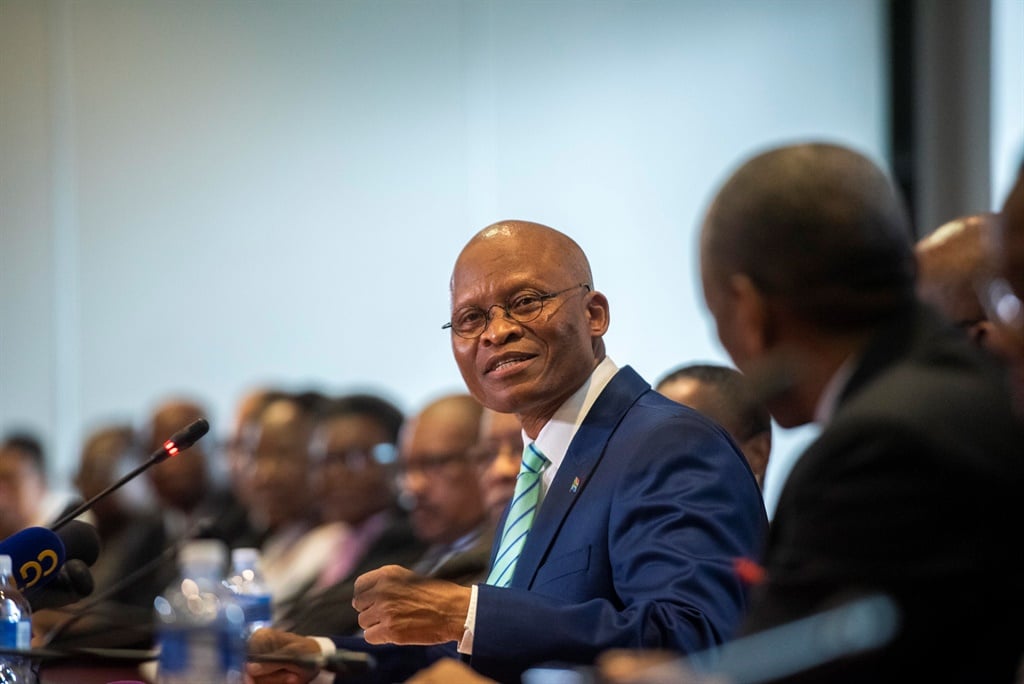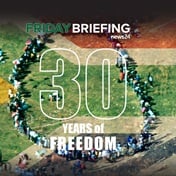
The integrity, legitimacy, credibility, and public confidence in the courts is dented almost daily. It is time for the chief justice to do something to redeem the image of the country's judiciary, writes Omphemetse Sibanda.
What a month it has been for the judiciary.
First, Chief Justice Mogoeng Mogoeng hit back with a razor-sharp 39-page appeal against a Judicial Service Commission ruling by retired Deputy President Phineas Mojapelo, in which he was ordered to apologise and retract his public comments on SA's foreign policy on Israel.
The flaming character of the chief justice stood forth, on many points, controversially and interestingly as he lashed out at Mojapelo.
He labelled Mojapelo hypocritical and accused him of inconsistency and double standards as Mojapelo himself once expressed a view that may be considered dabbling in political speech.
It was interesting to see Mojapelo and Mogoeng lock horns.
Mogoeng's appeal attacked Mojapelo's finding and the latter essentially accused Mogoeng of conduct unbecoming of the chief justice.
To recap what transpired, Mojapelo's findings were that the man at the helm of our judiciary had involved himself in politics; did not respect the separation of powers; abused the prestige of judicial office to advance private interests; conducted himself with less care at the risk of conflict with his judicial obligations; and engaged in extra-judicial activities that were incompatible with the confidence in and impartiality of judges
That was an astonishing rebuke of the chief justice by the retired judge president.
The Constitutional Court also grabbed the spotlight last week when it infamously extended an olive branch to former president Jacob Zuma.
Judicial Conduct Tribunal report on Hlophe
And, just when people thought the judiciary was ready to move out of the limelight, the Judicial Conduct Tribunal released a highly critical report, finding the judge president of the Western Cape High Court, John Hlophe, guilty of gross misconduct, paving the way for his impeachment.
READ | Days of reckoning for Zuma and Hlophe: Will ConCourt and JSC imprison and push to impeach?
Then the Supreme Court of Appeal struck a heavy blow to former president Jacob Zuma by ruling that he didn't deserve state funding for his legal woes.
At the same time, a legal-political spectacle played out at the Judicial Service Commission (JSC) where interviews were being conducted for two vacant posts at the Constitutional Court.
Members of the panel grilled candidates to assess if they were fit and proper to be members of the land's highest court.
Some of the questions, it must be stated, were laden with political antagonism.
For instance, KwaZulu-Natal Judge Dhaya Pillay came under fire with EFF commander-in-chief Julius Malema, alleging that she is nothing but a "political activist" who is biased in favour of the ANC and Minister Pravin Gordhan. Pillay, a seasoned judicial officer who was made a judge of the Labour Court in 2000 and of the KwaZulu-Natal High Court in 2010, rebuked the insinuations of belonging to any political factions or favouring anyone in the ANC-led government, including Gordhan.
"My association with him has never affected my work and will not, going forward. I have made judgments against the Treasury and against Sars and it has never been a problem," she said.
During the interview Mogoeng announced that Minister Pravin Gordhan had shown a interest in Pillay's performance by wanting to know from the chief justice "how did my friend do" during her first JSC interview.
Gordhan has since written to the JSC to clarify the meeting he had with the Chief Justice in 2016. In a letter adressed to commission secretary Sello Chilane, Gordhan said he engaged with Mogoeng in his 'personal, professional' capacity on several occassions. He said the meeting in 2016 with Mogoeng was not to discuss Pillay but he did mention the interviews in passing. He said by that time it was already known that Pillay did not get the job.
Is our judiciary dabbling in politics and captured?
Malema during the JSC interviews made serious allegations that the South African judiciary is captured and that are dabbling in politics. The question is thus: Is the judiciary captured? Is there credence to the grouping called the top six?
The following question which Malema asked Pillay should not be dismissed lightly, despite the sometimes hostile relationship Malema has with the courts.
"Is that not judicial capture? You care quoting Oliver Tambo, a political speech given during a political party gathering. I will argue in a closed session that you are nothing but a political activist; you are part of Gordhan's faction. Would I be correct to say that?" he asked.
READ | 'You are nothing but a political activist,' Malema tells ConCourt judge candidate Dhaya Pillay
Political interventionist allegations against members of the judiciary are common place in South Africa. For instance, former Constitutional Court Justice Johann Kriegler and now chairperson of Freedom Under Law (FUL) recently accused Judge President Hlophe of making a "patently dishonest judgment" in favour of the ANC MP Bongani Bongo.
Is the judiciary ideologically and practically captured along party political lines? This needs to be investigated because it opens the judiciary to unattended attacks and allegations.
The Office of the Chief Justice must step in
An article from the Yale Law Journal on judicial corruption comes to mind as I advance that the time has come for the Office of the Chief Justice to launch a general inquiry into whether there is any misconduct of the judiciary or judicial corruption.
"Corruption in our court: What it looks like and where it is hidden" is a title of an article by Stratos Pahis.
In it, Pahis highlights the need to deal with every sprouting of corruption in the judiciary.
"A judiciary without honesty has little chance of executing its moral and constitutional duties, no matter how many rules of ethics exist. This is especially true…, where the judiciary is afforded wide discretion. Facts and law require interpretation; justice and equity require judgment. Every decision to grant a motion, follow precedent, interpret a statute or facts, set a sentence or damages - every decision left up to the discretion of a judge - is a potential opportunity for corruption. … And so we count on honest judges to navigate our ship of justice through these dangerous waters. But we do not just keep our fingers crossed and hope we have good captains at the helm," wrote Pahis.
"Justice is the vertebral column of any democratic society" and a judiciary besieged with such serious allegations of misconduct, political bias and judicial corruption will fail dismally to keep the vertebral column healthy. Keeping our fingers crossed and hoping good captains are at the helm of our judiciary and government to address our judiciary's ailments will help no one.
There is now an urgent need to investigate and put to rest all allegations against our judiciary.
The integrity, legitimacy, credibility, and the public's confidence in the courts is getting dented almost daily.
Only a full-blown inquiry into the state of our judiciary will rescue the justice system from descending into chaos and an enclave of injustice. This may be the most complicated task in the process of re-establishing the integrity of the judiciary, but it must be done.
From the courtrooms, we must also see the emergence of conscientious and fearless judges and magistrates, dedicated to an impartial, uncorrupted and legitimate judiciary, which is not afraid of touching a raw nerve with the rank and file of government and political parties.
- Professor Dr Omphemetse S Sibanda, Legal Scholar Without Borders, is a Professor of Law and the Executive Dean of the Faculty of Management and Law at the University of Limpopo. He holds a Doctor of Laws (in International Economic Law) from North-West University, a Master of Laws from Georgetown University Law Centre, US; and an LLB (Hon) and B Juris from the former Vista University, Soweto Campus.
Disclaimer: News24 encourages freedom of speech and the expression of diverse views. The views of columnists published on News24 are therefore their own and do not necessarily represent the views of News24.




 Publications
Publications
 Partners
Partners
























